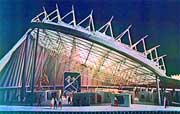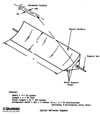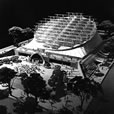Bicentennial Solar Pavilion for the Arts,
Minnesota State Fairgrounds, St.Paul, Minnesota, 1975
Collaborating Mechanical Engineers: Prof. Perry Blackshear, University of Minnesota, Institute of Technology, and Sheldahl Corporation
This project was the first proposal for an "annual-cycle energy system" powered entirely by the sun in the Upper Midwest.
See this video regarding concentrating solar energy collection systems:
 |
|---|
Appendix A: Dr. Perry L. Blackshear Report on Annual Cycle Thermal Energy Storage System
Appendix B: Dr. Donald E. Anderson Report on Solar Linear Array Thermal System - SLATS™
 View to the interior of the Solar Pavilion Project scale model, showing the catenary truss " lens" supporting the rooftop array of sun-focusing mirrors. The roof edge ring is supported by columns, and the exhibition space is enclosed on the perimeter by a non-load bearing skirt between the low wall and the roof ring.
View to the interior of the Solar Pavilion Project scale model, showing the catenary truss " lens" supporting the rooftop array of sun-focusing mirrors. The roof edge ring is supported by columns, and the exhibition space is enclosed on the perimeter by a non-load bearing skirt between the low wall and the roof ring. View of the Project model looking north.
View of the Project model looking north. Wall painting from the Stanzino delle Matematiche in the Galleria delgi Uffizi (Florence, Italy), Painted by Giulio Parigi (1571- 625) in the years 1599-1600. According to a controversial story from ancient history, the Greek scientist, Archimedes of Syracuse (287 BCE - 212 BCE), ignited the enemy Roman wooden ships by concentrating the rays of the sun, using some kind of burning mirror or system of mirrors, and by focusing the solar energy to cause combustion of the wooden parts and fabric sails of the encroaching Roman ships.
Wall painting from the Stanzino delle Matematiche in the Galleria delgi Uffizi (Florence, Italy), Painted by Giulio Parigi (1571- 625) in the years 1599-1600. According to a controversial story from ancient history, the Greek scientist, Archimedes of Syracuse (287 BCE - 212 BCE), ignited the enemy Roman wooden ships by concentrating the rays of the sun, using some kind of burning mirror or system of mirrors, and by focusing the solar energy to cause combustion of the wooden parts and fabric sails of the encroaching Roman ships. Photograph of an experiment by Dr. Ioannis Sakkas, in which he lined up 60 Greek sailors who each held a mirror angled to reflect sunlight onto a small wooden boat 160 feet away in the harbor. The boat was ignited instantly, thus giving credance to the ancient Archimedes legend.
Photograph of an experiment by Dr. Ioannis Sakkas, in which he lined up 60 Greek sailors who each held a mirror angled to reflect sunlight onto a small wooden boat 160 feet away in the harbor. The boat was ignited instantly, thus giving credance to the ancient Archimedes legend. Abel Pifre (1852-1928), a French engineer, developed the first solar-powered printing press in 1878. The solar heated boiler capacity was 11 gallons, and the focusing mirror was 11.5 feet in diameter. The press was run in the afternoon sunlight, and even under semi-cloudy conditions printed five hundred copies per hour a journal appropriately named Soleil-Journal.
Abel Pifre (1852-1928), a French engineer, developed the first solar-powered printing press in 1878. The solar heated boiler capacity was 11 gallons, and the focusing mirror was 11.5 feet in diameter. The press was run in the afternoon sunlight, and even under semi-cloudy conditions printed five hundred copies per hour a journal appropriately named Soleil-Journal. An early solar-powered irrigation pump.
An early solar-powered irrigation pump. Using parabolic mirrorw, a solar-powered trumpet performed in a Belgian rock music festival in the 1960s.
Using parabolic mirrorw, a solar-powered trumpet performed in a Belgian rock music festival in the 1960s. In the 1970s the Sheldahl Corporation developed the SLATS focusing reflector system, shown here in prototype. Holloway incoporated this system into this proposal for the Minnesoa State Fair's Bicentennial Solar Pavilion for the Arts in 1976. The mirror array covering the circular roof of the art exhibition hall was engineered to provide supply for all ANNUAL CYCLE energy requirements of the architecture, including heating, cooling, and electric power.
In the 1970s the Sheldahl Corporation developed the SLATS focusing reflector system, shown here in prototype. Holloway incoporated this system into this proposal for the Minnesoa State Fair's Bicentennial Solar Pavilion for the Arts in 1976. The mirror array covering the circular roof of the art exhibition hall was engineered to provide supply for all ANNUAL CYCLE energy requirements of the architecture, including heating, cooling, and electric power.


 Thumbnail panels:
Thumbnail panels:
© 2009, Dennis R. Holloway Architect






















